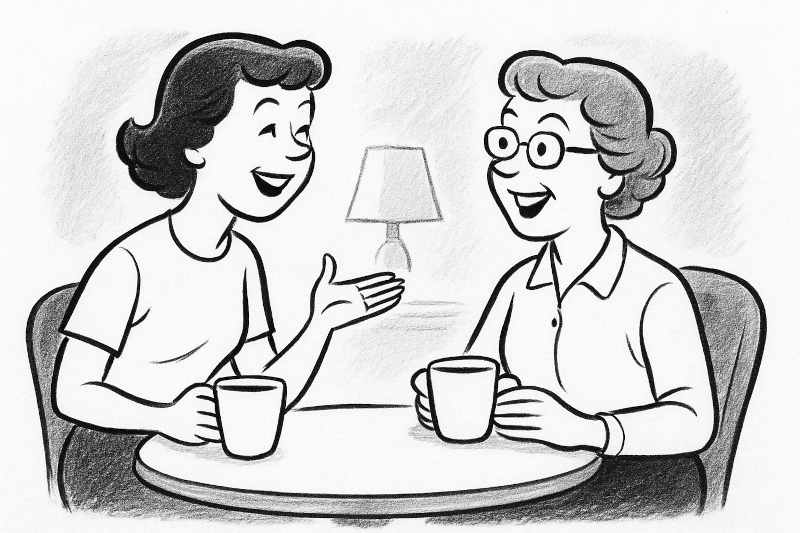Stressful jobs lead to stressful lives; this is a pretty basic concept. One accepted way of dealing with tension is to talk things out with a friend or confidant; that’s pretty standard, and something I had been practicing with Muriel1 for several years. She was a busy professional, trying to balance a career and family at the same time. She found it therapeutic to talk for long periods of time about incidents in her job that she couldn’t seem to let go of. Certain cases would stay with her due to the inherent injustice, ineptitude, or negative attitudes of her colleagues. These incidents rankled her and caused her to review her own actions, prompting our talks. After explaining a situation in detail, Muriel would seek validation for her own point of view.
We have been communicating for so many years that our conversations take on the same predictable flow as a well-traveled route down a favorite river. Muriel lays out her complaints and I hear them and soothe her. She raises a few more points but after parry and riposte, she is relieved of her burdens and all is well.
This might seem unremarkable. What is the basis of any conversation but to raise a point or comfort a friend? The problem is revealed in the next phone call, when Muriel begins anew. Like Sisyphus with his rock, all progress of the previous days are unmade as if they never existed. Her complaints are begun in earnest from the start, as stark as if they were a fresh offense. I begin to feel a little like Bill Murray and check my calendar to reassure myself that it is not, in fact, Groundhog’s Day.
“You see where I’m coming from?” Muriel will ask in an almost verbatim appeal, again and again. Altering the script on my end doesn’t seem to matter much. The next phone call begins with the same litany of complains.
The question isn’t whether Muriel has a problem for which she needs a qualified medical professional. The question is whether you have a Muriel in your own life to some degree and what can be done about it.
We all know people who seem “stuck” like this. Perhaps they do need a therapist. Maybe they are seeing one currently and you aren’t in a position to know that, or the therapy/medicine isn’t enough/effective at present. Therapy is a wonderful tool, but we aren’t always able to know or recommend that people around us seek the help that they require. How, then, can we help those individuals—and ourselves—in these challenging situations?
Let’s face it: most of us aren’t therapists. Many of us haven’t even been trained or had a class about how to deal with difficult emotions, so it might be daunting to think about dealing with our co-workers, friends and family who are in crisis. The great news, however, is that anyone, even a layperson, can use a few simple techniques to put a friend at ease. One of those techniques is to switch from passive listening to reflective listening.
Imagine you are pouring your heart out or giving a report and the person you are speaking to isn’t looking at you. They are staring at their phone, scrolling and nodding. They might say “mm-hm” every once in a while or wait for their turn to make a point. It doesn’t engender a sense of confidence that your conversation is being absorbed on the other end. This is passive listening.
Reflective listening uses mirroring, paraphrasing, core messaging, affect labeling and “you statements” to let the listener know that you are hearing their message. For example, when your mom is talking and talking, even over the phone, you might say “Mom, you’re saying you love and miss me. I miss you, too.” Using “you” instead of “I” to label the other person’s emotions or experiences that they have been relating helps them feel less defensive. Telling them what they told you in your own words lets people know that they are being heard.
Sometimes this is difficult; it requires attention, understanding and empathy, which you may not have to give to everyone in your life at all times. If, however, you are able to practice reflective listening at some times, you may find that some of the people with whom you normally engage “wake up” and stop their cycle of complaints. It could be that they have been accustomed to speaking a long time because they aren’t feeling heard, and this is a simple solution for the attention and connection they are craving. You have a right to set boundaries on your time, so only listening for a time that works for you is perfectly healthy and acceptable.
Everyone wants and needs to be heard. The root of many complaints is not to find a solution but just to feel understood and heard. Likewise, if you are the one with many troubles, find a person who makes you feel understood. Friendship is not about the time spent talking, but the quality of the connection. Is there a connection out there for you? Are you willing to change the connections you do have by simply learning how to listen?
- Some details have been changed to protect the privacy of this person. ↩︎



